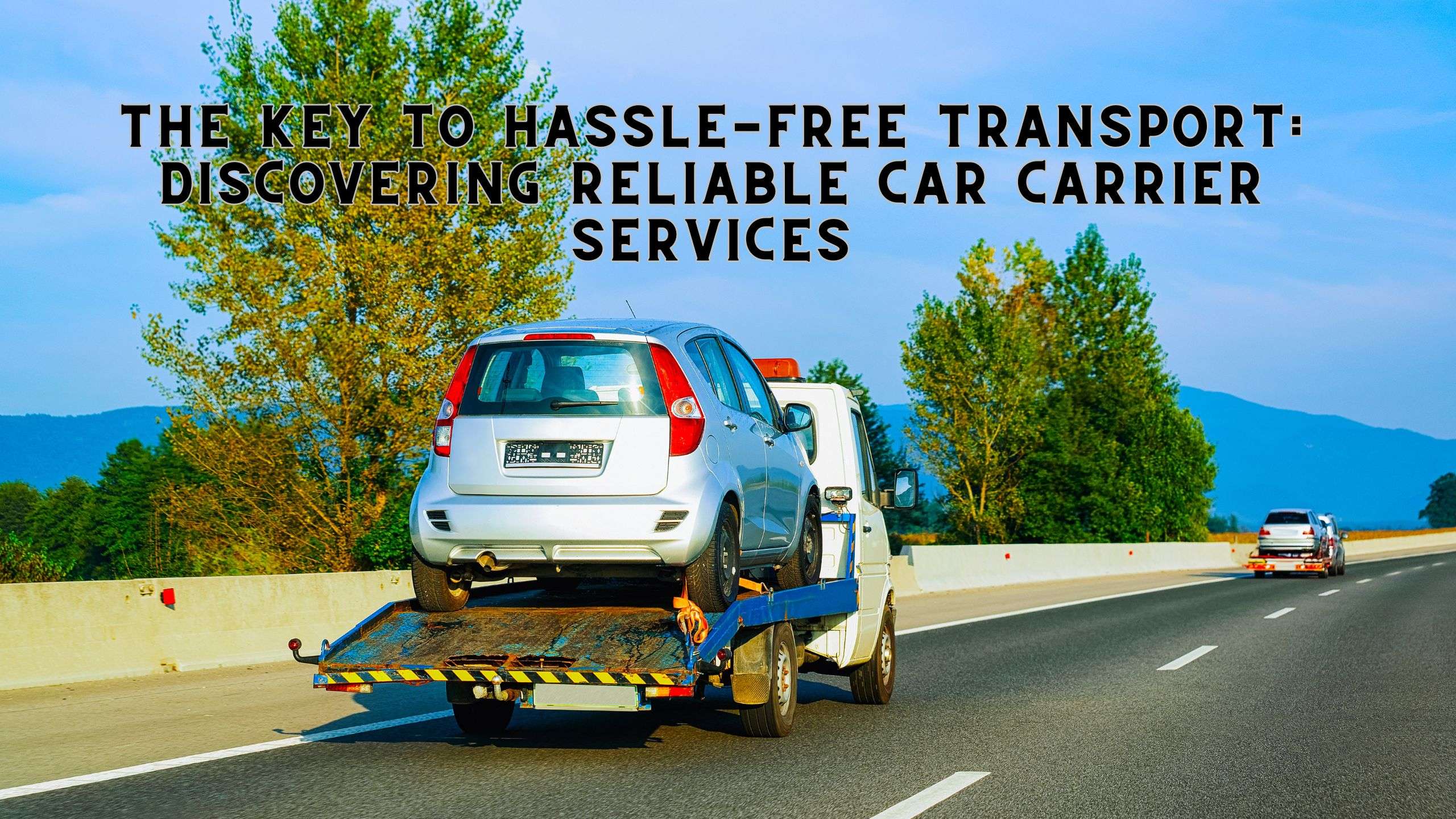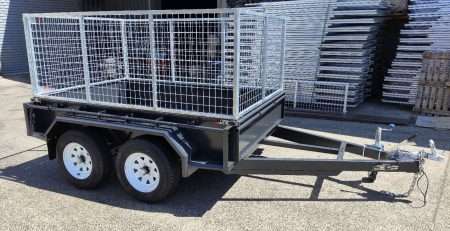
The Key to Hassle-Free Transport: Discovering Reliable Car Carrier Services
Understanding Carrier Services
Car carrier service plays a crucial role in the transportation of vehicles, providing a convenient and efficient solution for individuals who need to transport their vehicles over long distances. Whether you’re relocating to a new city or purchasing a vehicle from a different state, car carrier services can simplify the process and ensure the safe delivery of your vehicle (NerdWallet).
What is car carrier service?
Car carrier service, also known as auto transport service, refers to the transportation of vehicles from one location to another using specialised carriers. These carriers are designed to securely hold and move vehicles, ensuring their safety during transit. Car carrier service providers offer both local and long-distance transportation options, catering to individual customers, dealerships, and manufacturers.
Benefits of Carrier Service
Car carrier service offers several benefits for individuals who need to transport their vehicles:
- Convenience: Car carrier services eliminate the need for individuals to drive their vehicles long distances or arrange for multiple drivers. Instead, the vehicles are loaded onto carriers, allowing owners to focus on other aspects of their move or travel.
- Efficiency: Car carrier services provide a faster and more efficient transportation option compared to driving the vehicle yourself. With professional carriers and experienced drivers, the process is streamlined and ensures timely delivery of your vehicle.
- Safety and Security: Carriers used in car carrier services are designed to securely hold vehicles in place during transportation, minimising the risk of damage. Reputable car carrier service providers, such as SGT Auto Transport, prioritise the safety of your vehicle during shipping and have a network of carefully vetted carriers that they rely on for transportation. They have the expertise and experience to ensure that your vehicle is protected and arrives safely at its destination.
- Cost-Effectiveness: Car carrier services can be a cost-effective option, especially when considering factors such as fuel expenses, accommodations, and potential wear and tear on the vehicle during a long-distance drive. Additionally, car carrier services may offer various pricing options to suit different budgets.
By utilising car carrier services, individuals can enjoy a hassle-free transportation experience for their vehicles, whether it’s for personal or business purposes. It provides peace of mind knowing that professionals are handling the logistics and ensuring the safe delivery of your valuable asset.
In the next sections, we will explore the factors that affect car carrier costs, the different types of car carriers available, and how to choose the right carrier for your vehicle.
Factors Affecting Car Carrier Costs
When it comes to car carrier services, several factors come into play when determining the cost of transporting a vehicle. Understanding these factors can help you estimate the expenses involved and make informed decisions. The primary factors that affect car carrier costs include distance and location, vehicle type and size, and transportation method.
Distance and location
The distance to be covered and the specific locations involved are key determinants of car carrier costs. Shipping a car domestically within the United States will generally have different pricing compared to international shipping. According to Forbes, the average cost to ship a car within the United States ranges from $500 to $1,500. However, shipping a car internationally can cost significantly more, ranging from $1,000 to $5,000 or more, depending on the destination and other factors.
Additionally, the pickup and delivery locations can impact the cost. If the locations are remote or difficult to access, it may result in higher expenses due to the additional effort required for transportation.
Vehicle Type and Size
The make, model, and size of the vehicle being transported also affect the cost of car carrier services. Larger and heavier vehicles may require specialised equipment or carriers, which can result in higher costs. For instance, transporting a compact car will generally be more affordable compared to shipping a large SUV or truck.
Furthermore, the condition of the vehicle may also be a factor. Non-running vehicles or those requiring special handling may incur additional fees. It’s important to discuss these details with the car carrier service provider to get an accurate quote.
Transportation Method
The method of transportation chosen for your vehicle can influence the cost. Two common types of car carriers are open car carriers and enclosed car carriers. Open-car carriers, which transport multiple vehicles at once, tend to be more affordable compared to enclosed carriers. However, enclosed carriers offer more protection for the car during transit.
According to Forbes, the choice between open and enclosed carriers can impact the price. The time of year can also affect the cost of shipping a car, with peak seasons like summer and holidays often having higher prices.
To get a better idea of the average cost for different distances and car carrier types, refer to the data provided by Move.org. On average, the cost to ship a car is approximately $1,108, ranging from about $510 for a few hundred miles on an open carrier to around $1,580 for cross-country transport in an enclosed truck.
When seeking car carrier services, it is advisable to collect several quotes from different providers to compare prices and services offered. This allows you to make an informed decision based on your budget and specific requirements. Remember that the quote provided by a car shipping company is an estimate based on factors such as the size of the vehicle, the distance of transport, and the carrier’s availability and pricing (Move.org).
By considering the distance and location, vehicle type and size, and transportation method, you can better understand the factors that influence the cost of car carrier services. Obtaining multiple quotes and conducting thorough research on reputable car carrier service providers will help ensure a hassle-free and reliable transport experience for your vehicle.
Types of Car Carriers
When it comes to car carrier service, there are two main types of carriers commonly used: open car carriers and enclosed car carriers. Each type has its own advantages and considerations, allowing you to choose the right carrier for your vehicle based on your specific needs.
Open-Car Carriers
Open-car carriers are the most common type of trailer used in car carrier service. These carriers are known for their open-air design, allowing vehicles to be transported on multiple levels. Open-car carriers can typically transport up to nine vehicles at a time, making them a cost-effective option for shipping multiple vehicles simultaneously.
One of the key advantages of open-car carriers is their affordability. Since multiple vehicles can be loaded onto a single carrier, the cost per vehicle is generally lower compared to other options. Open-car carriers are commonly used for transporting standard cars, SUVs, trucks, and even heavy equipment like ATVs or motorcycles.
However, it’s important to note that open-car carriers do not provide the same level of protection as enclosed carriers. Vehicles transported on open carriers are exposed to the elements, including weather conditions and road debris. While most carriers take precautions to secure and protect the vehicles during transit, there is still a possibility of minor exterior damage.
Enclosed car carriers
Enclosed car carriers offer an additional layer of protection for vehicles during transport. These carriers feature a fully enclosed design, providing a shield against external elements such as weather, dust, and road debris. Enclosed carriers are often chosen for high-value, luxury, or classic cars that require extra care and protection during transit (BKK Transport).
One of the main advantages of enclosed car carriers is the enhanced security and protection they provide. The enclosed design prevents exposure to weather conditions, reducing the risk of damage to the vehicle’s exterior. Additionally, the enclosed space offers added protection against potential theft or vandalism.
It’s worth noting that enclosed car carriers tend to be more expensive compared to open carriers due to the higher level of protection and individualised attention provided to each vehicle. These carriers are often the preferred choice for transporting high-value or classic cars where condition and appearance are of utmost importance.
Choosing the Right Carrier for Your Vehicle
Choosing the appropriate carrier for your vehicle is crucial to ensuring its safety during transport. Enclosed carriers are recommended for high-value or vintage vehicles that require maximum protection. On the other hand, open carriers are practical and cost-effective for hardy items like ATVs or heavy equipment. Consider factors such as the value, condition, and sensitivity of your vehicle when making a decision (LinkedIn).
When selecting a car carrier service provider, enquire about the types of carriers they offer and their experience handling vehicles similar to yours. Assess your priorities, budget, and specific needs to determine which type of carrier aligns best with your requirements.
By understanding the differences between open car carriers and enclosed car carriers, you can make an informed decision when choosing a car carrier service for your vehicle. Take into account the specific needs of your vehicle and consider factors such as cost, protection, and convenience to ensure a safe and hassle-free transport experience.
Ensuring Vehicle Safety During Transport
When it comes to car carrier service, ensuring the safety of your vehicle is of utmost importance. Proper loading, securing, and regular checks and inspections are key to a hassle-free and safe transportation process.
Loading and Unloading Process
Most damages to vehicles occur during the loading and unloading process. To minimise the risk, professional-grade equipment such as ramps and winches should be used, and the vehicle’s ground clearance should be considered to prevent undercarriage damage (LinkedIn). Carriers and drivers should exercise caution and follow proper loading protocols to avoid any unnecessary mishaps.
During the loading process, it’s essential to ensure that the vehicle is positioned securely on the carrier. The use of sturdy straps, wheel netts, and chains helps keep the vehicle in place and prevents shifting during transport. Additionally, carriers should take into account the dimensions, weight, and anchoring points specific to each vehicle type to ensure a secure fit.
Securing Vehicles for Transport
Properly securing vehicles is crucial to preventing any movement or damage during transit. High-quality straps and chains tailored to the vehicle’s weight should be used. The specific anchoring points may vary depending on the type of vehicle. For instance, motorcycles and ATVs might need additional supports to stay upright while cars should have all four wheels anchored (LinkedIn).
Carriers should ensure that the straps and chains are tightened adequately, but not excessively, to avoid causing unnecessary stress or damage to the vehicle. Regular checks during transport are essential to verify that the vehicle remains securely fastened and to make any necessary adjustments to the straps or chains to maintain stability.
Regular checks and inspections
Performing regular checks and inspections during the journey is crucial to ensuring the safety of the transported vehicle. Carriers and drivers should conduct periodic inspections to assess the condition of the vehicle and its security. This allows for the timely detection and resolution of any issues that may arise during transport.
Regular inspections can include checking the tension of straps and chains, inspecting the vehicle for signs of shifting or damage, and ensuring that no components have come loose. By being proactive and vigilant, carriers can prevent unforeseen incidents and ensure safe transport (LinkedIn).
By following proper loading and unloading procedures, securing the vehicle effectively, and conducting regular checks and inspections, car carriers can ensure the safety of the vehicles they transport. It is crucial for carriers to stay updated on the specific safety measures and requirements for different vehicle types. This knowledge, combined with professional-grade equipment and careful attention to detail, helps to minimise the risk of damage and ensure a smooth and secure transportation process.
Insurance for Carrier Service
When utilising a car carrier service to transport your vehicle, it’s essential to understand the insurance options available to protect your valuable asset during transit. Basic liability insurance, which protects the vehicle from damage the carrier may cause during transportation, is a legal requirement for car carriers. However, it’s worth noting that this requirement applies to companies physically transporting the vehicle, not brokers.
Basic Liability Insurance
Car carriers offer basic liability insurance at no additional cost. This insurance covers damage that the carrier causes during transportation, such as mishandling or accidents. While this coverage is mandatory, it may have limitations and exclusions. It’s important to understand the specific terms and conditions of the insurance policy to ensure that your vehicle is adequately protected.
Additional insurance options
To provide further protection for your vehicle during transport, many auto transportation brokers offer additional insurance options for a nominal fee. These optional insurance plans can provide coverage for damage caused by factors such as fire, theft, or accidents that are not covered by basic liability insurance. The coverage and cost of these additional insurance options may vary among different brokers and insurers.
The gap coverage that AmeriFreight offers is one example of additional insurance coverage. This coverage can be valued at up to $2,000 and is available for a price range of $50 to $100 (uShip). It’s important to enquire about the specific coverage options and costs when selecting a car carrier service provider.
Protecting Your Vehicle During Transport
While car carriers have insurance coverage in place, it’s also important to take precautions to protect your vehicle during transport. Reputable car carrier service providers, such as SGT Auto Transport, prioritise the safety and security of your vehicle throughout the shipping process. They have a network of carefully vetted carriers who are trusted to handle the transportation of vehicles safely.
To ensure the safety of your vehicle during transport, carriers employ various measures. These include:
- Loading and Unloading Process: Carriers follow proper loading and unloading procedures to minimise the risk of damage to your vehicle. This includes using appropriate equipment and techniques to ensure a smooth and secure transition.
- Securing Vehicles for Transport: Carriers take great care in securing vehicles properly, using tie-downs, wheel chocks, and other methods to prevent movement and minimise the risk of damage during transit.
- Regular Checks and Inspections: Carriers conduct regular checks and inspections to ensure that vehicles remain secure and undamaged throughout the journey. This includes monitoring tie-downs, checking for any signs of damage, and addressing any issues promptly.
By selecting a reputable car carrier service provider and taking the necessary precautions, you can help ensure the safety of your vehicle during transport. It’s important to thoroughly research and compare different companies, considering factors such as licencing, insurance coverage, and customer reviews (LinkedIn). Prioritising the safety and security of your vehicle will provide you with peace of mind throughout the transportation process.
Cost of Carrier Service
When considering car carrier service for transporting your vehicle, it’s important to understand the factors that can affect the cost as well as the average cost for different distances. Additionally, there are tips you can follow to ensure cost-effective car shipping.
Factors Affecting the Cost
The cost of car carrier service can vary depending on several factors. These factors include:
- Distance: The distance your vehicle needs to be transported plays a significant role in determining the cost. Generally, longer distances will result in higher shipping costs.
- Vehicle Type and Size: The make and model of your vehicle, as well as its size and weight, can impact the cost of transportation. Larger or heavier vehicles may require specialised equipment or carriers, which can increase the overall cost.
- Transportation Method: The method of transportation you choose can affect the cost. Open car carriers, which are more commonly used, tend to be more affordable compared to enclosed car carriers that provide additional protection for your vehicle during transit.
These factors can vary depending on your specific requirements and the car carrier service provider you choose. It’s essential to discuss these factors with the provider to receive an accurate cost estimate for your car shipping needs.
Average Cost for Different Distances
The average cost to ship a car can vary based on the distance and other factors. According to Move.org, the average cost to ship a car within the United States is approximately $1,108. However, the cost can range from around $510 for shorter distances on an open carrier to about $1,580 for long-distance transport in an enclosed truck.
Here is a breakdown of the average costs for different distances:
| Distance | Average Cost |
|---|---|
| Short Distance (a few hundred miles) | $510 – $800 |
| Medium Distance (1,000–2,000 miles) | $800-$1,200 |
| Long Distance (cross-country) | $1,200 – $1,580 |
These figures serve as general estimates, and actual costs may vary depending on the factors mentioned earlier as well as other considerations specific to your transport needs.
Tips for Cost-effective Car Shipping
To ensure cost-effective car shipping, consider the following tips:
- Plan Ahead: Booking your car carrier service well in advance can potentially save you money. Last-minute bookings often come with higher costs due to limited availability.
- Compare Quotes: Obtain quotes from multiple car carrier service providers and compare their prices, services, and reputation. This will help you find the best balance between cost and quality.
- Flexible Dates: If possible, be flexible with your pickup and delivery dates. Certain times of the year, such as peak seasons like summer and holidays, may have higher prices. Choosing off-peak periods can help you secure better rates.
- Choose Open Car Carriers: Open car carriers are generally more cost-effective compared to enclosed car carriers. Unless your vehicle requires extra protection, opting for an open carrier can help lower your shipping costs.
- Avoid Additional Services: Be mindful of additional services that may increase the cost, such as expedited shipping or door-to-door delivery. Assess whether these services are necessary for your specific situation to avoid unnecessary expenses.
By considering these tips and understanding the factors that affect the cost of car carrier service, you can make informed decisions and ensure a more cost-effective transportation experience for your vehicle. Remember to always conduct thorough research, gather multiple quotes, and choose a reputable car carrier service provider to ensure reliable and hassle-free transport.
Choosing a Carrier Service Provider
When it comes to car carrier service, selecting a reliable and reputable provider is crucial to ensuring a smooth and hassle-free transport experience. Here are some key factors to consider when choosing a car carrier service provider:
Researching and Comparing Companies
Before making a decision, it’s important to conduct thorough research and compare different car carrier service providers. Look for companies with a proven track record and a positive reputation in the industry. Reading customer reviews and testimonials can provide valuable insights into the quality of their services. Additionally, check if the company is registered and accredited with relevant transportation authorities.
Licencing and Insurance
One of the most critical aspects to consider is the licencing and insurance coverage of the car carrier service provider. Ensure that the company holds all the necessary licences and permits to operate legally. This indicates their compliance with industry standards and regulations. In terms of insurance, verify that the provider offers adequate coverage for your vehicle during transport.
In case of any damages or incidents, having insurance coverage can provide you with peace of mind and financial protection. It’s advisable to review the insurance policies offered by the car carrier service provider and understand the terms and conditions. If needed, consider additional insurance options to further safeguard your vehicle (NerdWallet).
Customer reviews and quotes
To gain a better understanding of the quality and reliability of a car carrier service provider, take the time to read customer reviews and testimonials. These reviews can offer insights into the experiences of previous customers and help you assess the level of customer satisfaction.
Additionally, it’s recommended to obtain quotes from multiple car carrier service providers. This allows you to compare prices and services to ensure you are getting the best value for your money. Keep in mind that the cost of car carrier service can vary based on factors such as distance, vehicle type, and transportation method (Forbes). Collecting several quotes enables you to make an informed decision and choose a provider that fits your budget and requirements (Move.org).
By thoroughly researching, verifying licencing and insurance, and considering customer reviews and quotes, you can confidently choose a car carrier service provider that meets your needs. Remember to communicate any specific requirements or concerns with the provider to ensure a seamless and secure transportation process.
Preparing Your Vehicle for Car Carrier Service
Before entrusting your vehicle to a car carrier service, it is important to take certain steps to ensure a smooth and hassle-free transport experience. This section will guide you through the necessary preparations, including vehicle inspection, documenting existing damages, and notifying the carrier of any damages.
Vehicle Inspection Before Transport
Performing a thorough inspection of your vehicle before transport is essential. This involves carefully examining the exterior and interior of your vehicle to document its current condition. By conducting this inspection, you can identify any pre-existing damages and note them down for reference.
During the inspection, pay attention to any scratches, dents, or other visible damages on the body of the vehicle. Additionally, check the condition of the tyres, windows, mirrors, and any other components that may be susceptible to damage during transport. Taking clear photographs or videos of the vehicle from multiple angles can serve as valuable evidence in case of any disputes or claims.
Documenting Existing Damages
Once you have completed the vehicle inspection, it is crucial to document any existing damages. This documentation provides a detailed record of the vehicle’s condition before transport and can be used as a reference point if any issues arise during or after the transportation process.
Make sure to include written descriptions of each identified damage, along with the corresponding photographs or videos. Note down the location, size, and nature of each damage, as this information will be helpful when discussing the condition of the vehicle with the car carrier service provider.
Notifying the carrier of damages
In the event that your vehicle sustains any damage during transport, it is important to promptly notify the car carrier service provider. Most reputable providers have insurance coverage to protect against damages that may occur during transit. Notifying them as soon as possible will allow them to initiate the claims process and address the situation accordingly.
When notifying the carrier, be prepared to provide detailed information about the damages, including the nature and extent of the damage, as well as any supporting documentation gathered during the vehicle inspection process. This will help facilitate the resolution of the issue and ensure that the necessary actions are taken to address the damages.
By following these steps of vehicle inspection, documenting existing damages, and notifying the carrier of any damages, you can help ensure a smoother and more secure transport experience for your vehicle. It is always recommended to thoroughly research and choose a reliable car carrier service provider that prioritises the safety and security of your vehicle throughout the transportation process.
Author
I am Rahatul Ashiq Tamal. Another author of Muscle Trailers. Muscle Trailers is a well-known trailer brand in Sydney, Melbourne & Adelaide

How to Mount a Spare Tire on Your Trailer: A Simple Step-by-Step Guide
Trailer service centers receive over 1 million phone calls and 1.3 million emails each year about trailer maintenance problems....

How to Fix RV Roof Leaks: Simple Roof Leak Detection Guide for Beginners
Did you know DIY RV roof repairs can cost under $50? But undetected leaks could lead to substantially higher repair...

Starting a Food Truck Business in Australia: From Trailer Selection to Launch
The Australian mobile food market has evolved into a billion-dollar industry. This makes a food truck...
